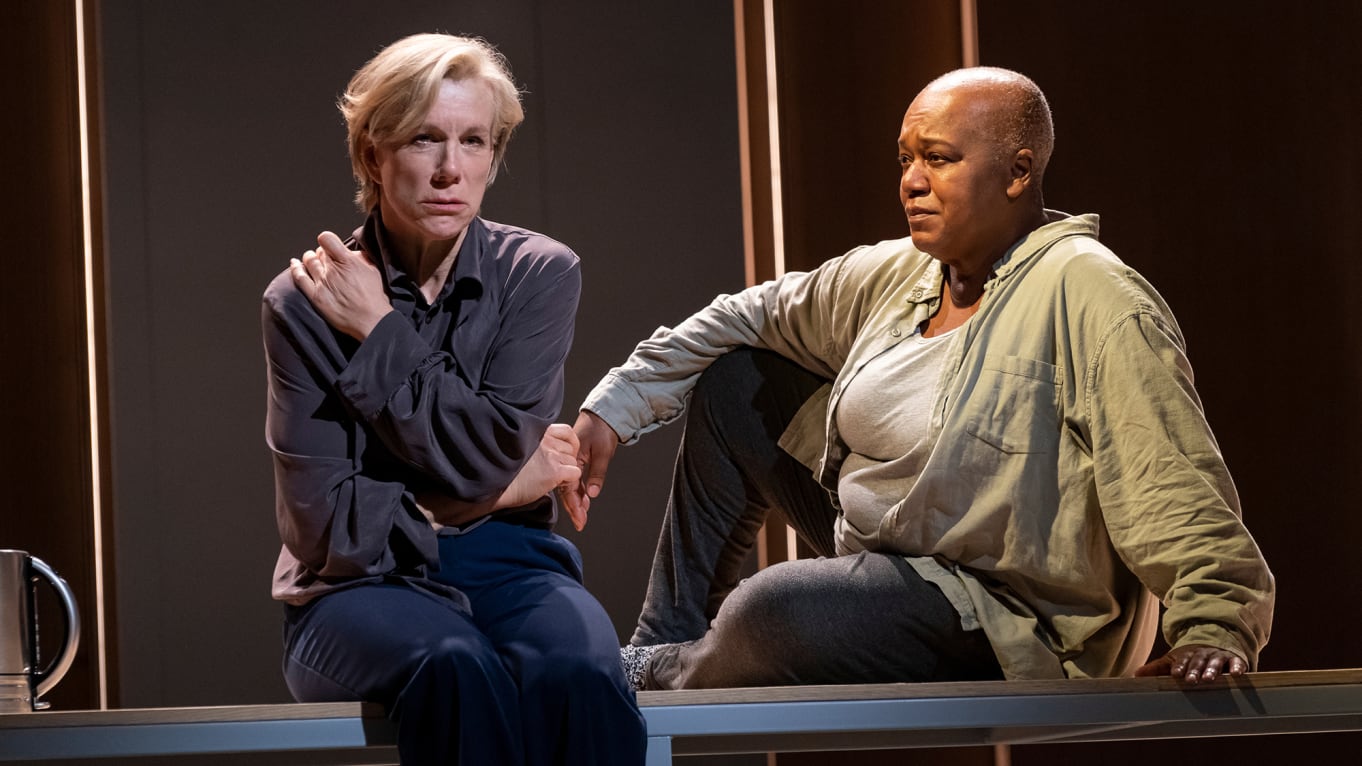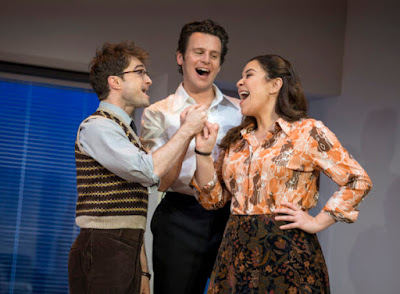What: Park Avenue Armory hosts the North American premiere of Robert Icke's reimagined look at Arthur Schnitzler's 1912 play Professor Bernhardi. A Jewish doctor at a private institute prevents a Catholic priest from reading last rites over a dying teenager, a conflict that snowballs into disastrous consequences for the doctor and the institute. Robert Icke reimagines Schnitzler's study of antisemitism into a critique of identity politics as a whole.
And? I'm mostly going to be talking about the ideas and arguments of the play, so let me say up front, it's incredibly effective theater, which is always impressive with such a talky (well, shouty) play. The cast is all top-notch, and drummer Hannah Ledwidge keeps the air taut under every argument.
The casting plays an interesting trick on the audience, one that isn't immediately clear: of the many identities represented in the text of the play (gender, ethnicity, trans), most of the characters are not played by actors who represent what seems to be their most "important" identity marker. So we watch Jewish Professor Wolff, as played by gentile Juliet Stevenson, argue with a Catholic priest (played by John Mackay, a white actor), not realizing until much later that the optics are not what we assumed: the priest is a Black man. We also note as the play goes on that some male characters are played by women, some white characters are played by people of color, etc. No one is whom we think they are, at least when it comes to visible identity markers. At first I was annoyed by what seemed a too-proud-of-its-edginess gimmick by another white director. But as Professor Wolff continues to defend her actions, insisting that she doesn't do "groups" (read: identity politics), it becomes clear that these identity inversions are meant to have us engage with the other characters through her lens, where these things shouldn't matter.
But, of course, they actually do matter. When the story leaks, her name is not released, but it is known that she is a Jewish woman (which means, in the characters' reality, she is visibly ethnically Jewish). When the story leaks, it matters that a Jewish woman physically barred a Black Catholic man from administering rites. It matters that her antagonistic colleague is a white Catholic man who offers her a trade of making the story go away if she chooses a Black Catholic male candidate over a white Jewish female candidate in an upcoming hiring, regardless of their actual competence. All of these identity markers become more important than the individuals themselves. In the social media maelstrom that follows the initial altercation, identities become the story much more than the actual case of a doctor trying to shield the final moments of a dying patient from additional distress.
Professor Wolff wants to treat people as individual but faceless personalities, out of context of their lived realities. This includes refusing to engage not only with her own Jewish identity (she is non-practicing, and considers herself the child of Jewish people, not a Jewish person herself), but also with her being the widow of partner whose Alzheimer's no doubt prompted the institute's focus on curing dementia. It's a noble, if misguided, goal--to treat people in a vacuum. But it doesn't work in the real world, where the careless use of the word "uppity" triggers generations of trauma for Black people's subjugation at the hands of white people.
For me, there are several problems with how the play is executing this argument. There are some false equivalencies (Dr. Hardiman accuses the institute of being a "closed shop" for not hiring enough Christians, ignoring the history of Christians shutting out other religions/identities from many spaces and insisting they find their own space ... then knocking on the door demanding to be let in there too; though this hypocrisy is not addressed in the play). There is never quite the proper reckoning for the antisemitic attacks on Dr. Wolff once her identity is published; as if, in putting her hand on a Black man's shoulder to restrain him, she had it coming to lose her license, the institute she founded, and to have her car defaced with a swastika and her cat murdered, its blood spread over the door. In the play, as in conversations today, there seems to be an effort to pit Black people against Jewish people (ignoring, as always, the existence of Jews of color), where we must rank sufferings and decide whose pain to care about, because it can't be both. So, you know, White Supremacy doing its thing. But again, the play doesn't reckon with this either. It also doesn't reckon with the problematic racial bias in much of modern medicine, which not only treats the white male body as the default (to the detriment of accurate and compassionate treatment of both female patients and patients of color), but also built so many of its advancements on the backs of non-consensual experimentation on Black bodies. Quite frankly, a responsible doctor cannot afford to "not see race," when it comes to properly treating their patients.
And, though by the end of the play, I understand the why of the casting choices for this production, I think beyond the trick of making us reframe the opening scene into something more troubling, it may be a mistake. Professor Wolff may not think these identities matter, but we all know that they do. There's a missing nuance, here: identities matter just as much as individual selves. I am a Jewish woman, but that is not the only part of me that matters, nor am I all Jewish women contained in a monolith. And because of the casting move here, I began to feel a lack of some level of authenticity. A character here is trans, but played by a cis actor. If there were another trans actor in the cast to balance this out (as there are Black actors playing white characters to balance out the white actors playing Black characters), that would be one thing, but instead it just feeds into the already problematic history of trans actors rarely getting to tell their own stories. Same, of course, for the current conversation about how rarely Jewish women are cast as Jewish heroes. I get what Icke is doing, but it feels a bit too smug in thumbing its nose at the conversations of representation and identity, a mocking look at arguments for authenticity. The characters who insist that identity markers, or "groups," matter are portrayed as almost a parody in their panel debate with Professor Wolff.
 |
Juliet Stevenson and Juliet Garricks as Ruth Wolff and Charlie. Photo by
Stephanie Berger Photography. |









































